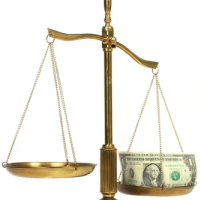More Evidence that TV Ads in Judicial Elections Lead to Less Sympathy for Defendants back in the Courtroom

Recent studies show it is getting more difficult for criminal defendants to win their cases due to judges looking over their shoulders and worrying about political accusations of being soft on crime.
This development stems from increases in campaign spending on races for state supreme court justice seats, two reports say.
A new report entitled Skewed Justice blames the Citizens United ruling by the U.S. Supreme Court, which opened the floodgates on corporate campaign spending. “Justices in states whose bans on corporate and union spending on elections were struck down by Citizens United were less likely to vote in favor of criminal defendants than they were before the decision,” states the report.
Authors Joanna Shepherd and Michael Kang say jumps in judicial campaign spending have led to more rulings against defendants appealing their convictions.
“State supreme court justices, already the targets of sensationalist ads labeling them ‘soft on crime,’ are under increasing pressure to allow electoral politics to influence their decisions, even when fundamental rights are at stake,” the report says.
It further states: “Citizens United (which removed regulatory barriers to corporate electioneering) has fundamentally changed the politics of state judicial elections. Outside interest groups, often with high-stakes economic interests or political causes before the courts, now routinely pour millions of dollars into state supreme court elections. These powerful interests understand the important role that state supreme courts play in American government, and seek to elect justices who will rule as they prefer on priority issues such as environmental and consumer protections, marriage equality, reproductive choice and voting rights. Although their economic and political priorities are not necessarily criminal justice policy, these sophisticated groups understand that ‘soft on crime’ attack ads are often the best means of removing from office justices they oppose.”
The conclusions of Shepherd and Kang echo those found in a 2013 report (pdf) by the Center for American Progress, which asserted: “As state supreme court campaigns become more expensive and more partisan, the fear of being portrayed as ‘soft on crime’ is leading courts to rule more often for prosecutors and against criminal defendants.”
The Shepherd/Kang study is based on the work of researchers from the Emory University School of Law who collected data from more than 3,000 state supreme court appeals from 32 states, and examined court opinions from 2008 to 2013.
-Noel Brinkerhoff
To Learn More:
Skewed Justice (by Joanna Shepherd and Michael S. Kang)
Increased Spending on Judicial Elections Leads to Increase in Guilty Verdicts (by Matt Bewig, AllGov)
Criminal and Campaign Cash (Center for American Progress) (pdf)
- Top Stories
- Unusual News
- Where is the Money Going?
- Controversies
- U.S. and the World
- Appointments and Resignations
- Latest News
- Trump Orders ICE and Border Patrol to Kill More Protestors
- Trump Renames National Football League National Trump League
- Trump to Stop Deportations If…
- Trump Denounces World Series
- What If China Invaded the United States?






Comments